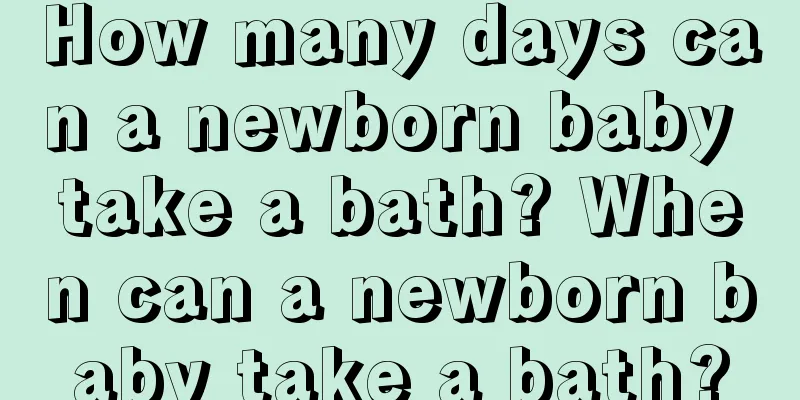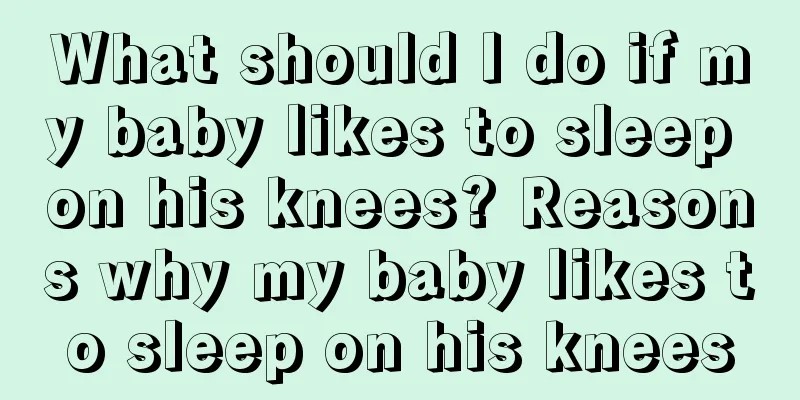What should I do if my child has herpes on his mouth? Is cerebral palsy the same as developmental delay?

|
Many parents worry that their children develop slower than other children. In fact, every child develops and grows differently. Many parents will classify cerebral palsy and developmental delay in children as the same. So are cerebral palsy and developmental delay the same? What should I do if my child has herpes in his mouth? What to do if a child has herpes on his mouth1. Ensure adequate sleep time, preferably a nap at noon; 2. Eat more fresh vegetables, supplement various vitamins, drink more water, and maintain nutritional balance in the body to enhance the body's immunity and prevent the occurrence of herpes; 3. Pay attention to oral hygiene. Rinse your mouth with light salt water after eating and rinse your teeth with salt water before going to bed. The effect is very good. Do not eat after brushing your teeth. Change your toothbrush frequently to avoid virus residue on the toothbrush, which may cause multiple herpes. 4. Avoid eating foods rich in arginine, such as chocolate, cola, peas, cereals, peanuts, gelatin, cashews, beer, etc.; 5. Exercise can strengthen the immune system, relax the mind, avoid tension and relieve stress, which is helpful in preventing and treating the recurrence of herpes simplex. 6. Symptoms of "getting angry" such as sore throat, sore gums, painful oral ulcers, erosion of the tip of the tongue, blistering of the lips, etc. "Getting angry" can be adjusted through diet, and "diet therapy" has a unique effect. Drink some chrysanthemum tea or green tea every day, eat something that can moisten the bowels, and get enough sleep. Avoid spicy food, drink plenty of water, and eat more fruits and vegetables. 7. The bubbles on your mouth should be a way for the body to detoxify. You should let it flush out fully. After it stabilizes, you can apply "chlortetracycline hydrochloride eye ointment" externally, and it will heal quickly. Is cerebral palsy the same as developmental delay?1. Cerebral palsy in children is different from mental retardation. They often have delayed motor development, uncoordinated movements, abnormal primitive reflexes, adjustment reactions and balance reactions. They are easily misdiagnosed as cerebral palsy in early infancy, but their symptoms of mental retardation are more prominent, their muscle tone is basically normal, and there are no abnormal postures. 2. There are differences between cerebral palsy and motor retardation in children. Some children's motor development is slightly behind normal children of the same age, especially premature children. However, they are not accompanied by abnormal muscle tone and posture reflexes, abnormal movement patterns, and other abnormal reflexes of the nervous system. The symptoms of motor retardation can disappear in a short period of time as the child grows older and focuses on sports training. 3. There is a difference between cerebral palsy in children and congenital myasthenia. Some children have obvious hypotonia, muscle weakness, and low or absent deep tendon reflexes after birth. Respiratory tract infections are common. This disease is sometimes misdiagnosed as hypotonic cerebral palsy, but the tendon reflexes of the latter can usually be elicited. 4. Cerebral palsy in children is different from progressive spinal muscular atrophy. The disease begins in infancy and symptoms appear after 3 to 6 months. A small number of patients have abnormalities after birth, manifested as symmetrical weakness of the upper and lower limbs, progressive muscle weakness, obvious muscle atrophy, decreased or disappeared tendon reflexes, and repeated respiratory tract infections due to respiratory muscle insufficiency. The children cry softly and cough weakly. Muscle biopsy can help confirm the diagnosis. The disease is not accompanied by mental retardation, facial expressions are alert, and eye movements are flexible. Therefore, when a child shows some symptoms that are different from normal children, it is necessary to take the child to a regular hospital for examination in time, find out the cause, and treat the disease accordingly, so as to give the child a healthy life. What is the reason for baby's stuffy nose1. Insufficient immune function: The baby is just born, the body has not yet adapted, the resistance is poor, and the immune function is insufficiency. If you do not pay attention to keeping warm, you will easily catch colds and other diseases. 2. Physiological factors: The maxillary bones and skull bones of newborn babies are not fully developed, and the nose and nasal cavity are relatively short; the nasal hairs in the nasal cavity are sparse; the nasal mucosa is tender, and the blood vessels and lymphatic tissues are relatively abundant in adults. Once encountering cold air and airflow with a high bacteria content, it can directly stimulate the nasopharynx, causing congestion and swelling of the nasopharyngeal blood vessels and mucosa, increase nasal secretions and scabs, and make the already narrow nasal cavity narrower or even blocked, thereby reducing the amount of oxygen inhaled and blocking the discharge of carbon dioxide. 3. Disease factors: Newborn nasal congestion is common in upper respiratory tract infections. Secondly, diseases of the nasal cavity itself, such as nasal polyps, nasal septum deviation, nasal foreign bodies or tumors, can cause nasal congestion in babies. In addition, certain allergic reactions can also cause nasal congestion. 4. Drug factors: Certain drugs can also cause congestion and swelling of the nasal mucosa, leading to nasal congestion. For example, pregnant mothers taking the antihypertensive drug reserpine can cause nasal congestion in newborn babies. Nasal congestion caused by general diseases needs to be distinguished from congenital nasal deformities. The former generally suffers from obvious diseases, such as rhinitis, while the latter is caused by congenital factors and needs to be determined in combination with further examinations. What to do if your baby has a stuffy nose1. Get enough rest For colds, good rest is essential. Let your child sleep more, reduce outdoor activities appropriately, and don't tire your baby. Take good care of your baby's diet and let your baby drink more water. Sufficient water can make the nasal secretions thinner and easier to clean. Let your baby eat more fruits and juices rich in vitamin C. It is said that chicken soup can relieve the symptoms of colds. You might as well make some chicken soup for your baby to drink. Try to eat less dairy products, which can increase mucus secretion. For babies with decreased appetite, mothers should prepare some easily digestible foods with good color, aroma and taste. 2. Let your baby sleep more comfortably If your baby has a blocked nose, you can put one or two towels under the child's mattress and slightly raise the head to relieve the blocked nose. Never let babies under two years old sleep directly on the pillow or put the pillow under the mattress, as this can easily cause suffocation or damage the cervical spine. 3. Help your baby blow his nose The baby is still too young to blow his nose by himself, so the best way to help the baby breathe smoothly is to help him blow his nose. You can apply a little Vaseline oil to the baby's external nostrils, which often relieves the blockage of the nose; if the nasal mucus is sticky, you can try to use a nasal aspirator or twist a medical cotton ball into a small stick to remove the nasal mucus; if the nasal blockage has caused difficulty in feeding, you can use saline nasal drops 15 minutes before feeding, and after a while, use a nasal aspirator to suck out the saline and mucus in the nasal cavity, and the baby's nose will be unobstructed. 4. Keep the air moist You can use a humidifier to increase the humidity in your baby's room, especially at night to help your baby breathe more easily. Don't forget to clean the humidifier with white vinegar and water every day to avoid the accumulation of dust and germs. 5. Give your baby a steam bath Take your baby to the bathroom with you, turn on the hot water or shower, close the door, and let your baby stay in the steamy room for 15 minutes. Your baby's stuffy nose will definitely get better. Don't forget to change your baby into dry clothes immediately after the bath. If you let your baby play in slightly warm water for a while, it can also relieve the symptoms of nasal congestion and lower the body temperature. |
<<: doppelherz German double heart folic acid tablets instructions_dosage
>>: Can swimming help babies grow taller? Can swimming help babies grow taller?
Recommend
Will drinking more water increase breast milk production? Will drinking more water increase breast milk production?
The biggest worry for many mothers during breastf...
Can the father take care of the baby alone? How can the father take care of the baby?
I don't know if it's spring that makes me...
What are the consequences of children being too fat? What are the dangers of children being too fat?
Most children are thin, and only a small number o...
How to drink water for baby's health
Nowadays, there are several types of water for dr...
When is the best time to start early childhood education? How to conduct early childhood education efficiently?
When is the best time to start early education? I...
How to choose a pillow to help your baby sleep better? Choose from these 4 points
Babies in their infancy need more sleep to mainta...
Can I cover my baby with a blanket when he has a fever and sweats? Will the baby's fever go away if he sweats?
When a baby is sick and has a fever and sweats, t...
Why should you avoid giving birth on an empty stomach?
Pregnant women are often at a loss when they are ...
Does Colgate toothpaste have tin foil seal? Does Colgate toothpaste contain fluoride?
I feel that the Colgate toothpaste I bought befor...
How to improve the cold parent-child relationship when the child talks back
As children grow up, parents and children begin t...
What are the secrets and techniques for having twins?
Mothers think that one child is lonely, and two c...
Is it really more painful to have a second caesarean section than a first?
The country has officially opened up the permissi...
How to read the fetal heart rate monitoring chart? How much does fetal heart rate monitoring cost?
In the third trimester, when pregnant mothers hav...
Symptoms of ADHD in children. What should I do if my child is hyperactive?
It is a sign of health for a child to be lively a...
How to clean the baby's nasal cavity? What should I pay attention to when cleaning the baby's nasal cavity?
When babies are just born, some secretions will a...









